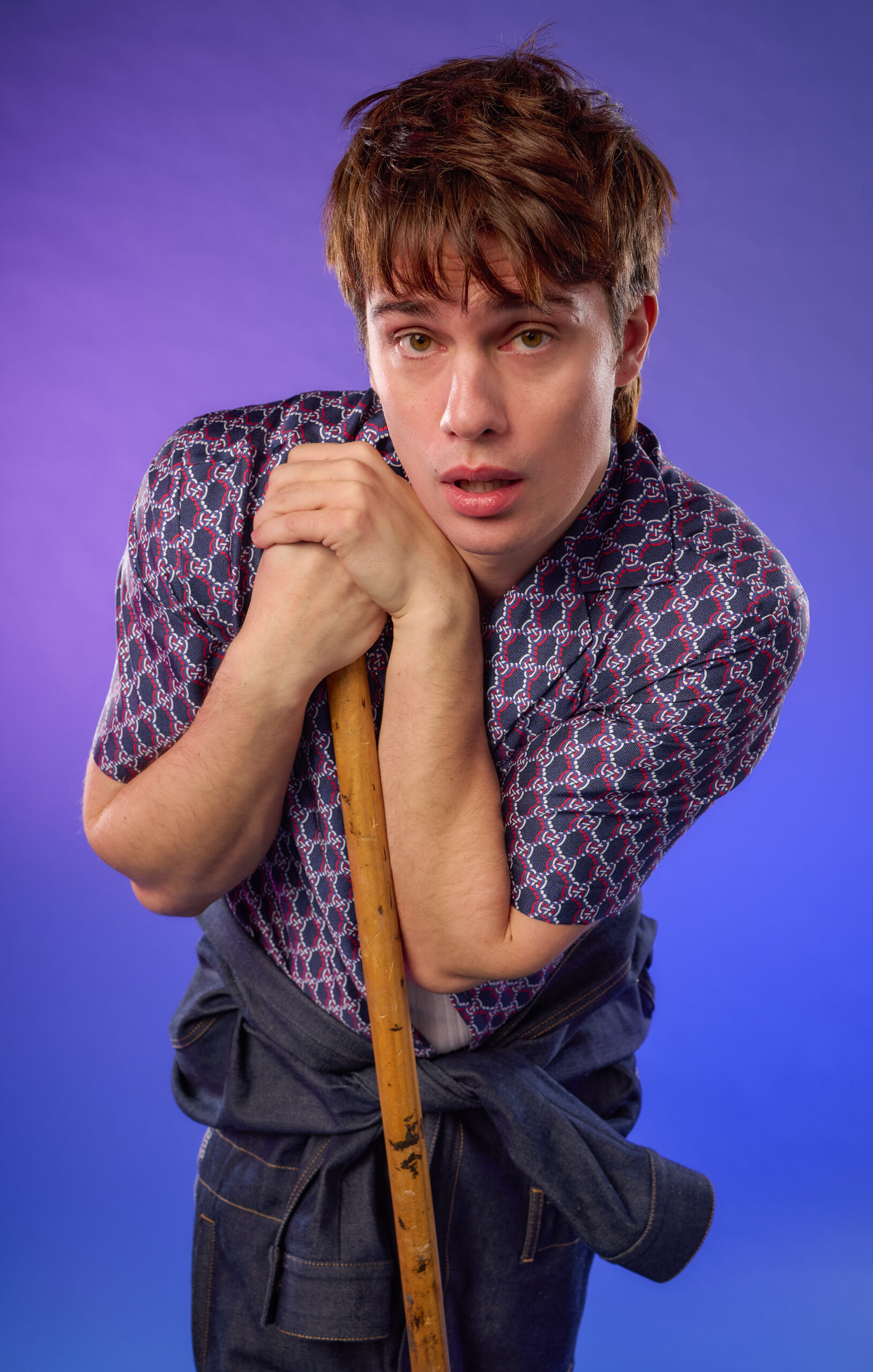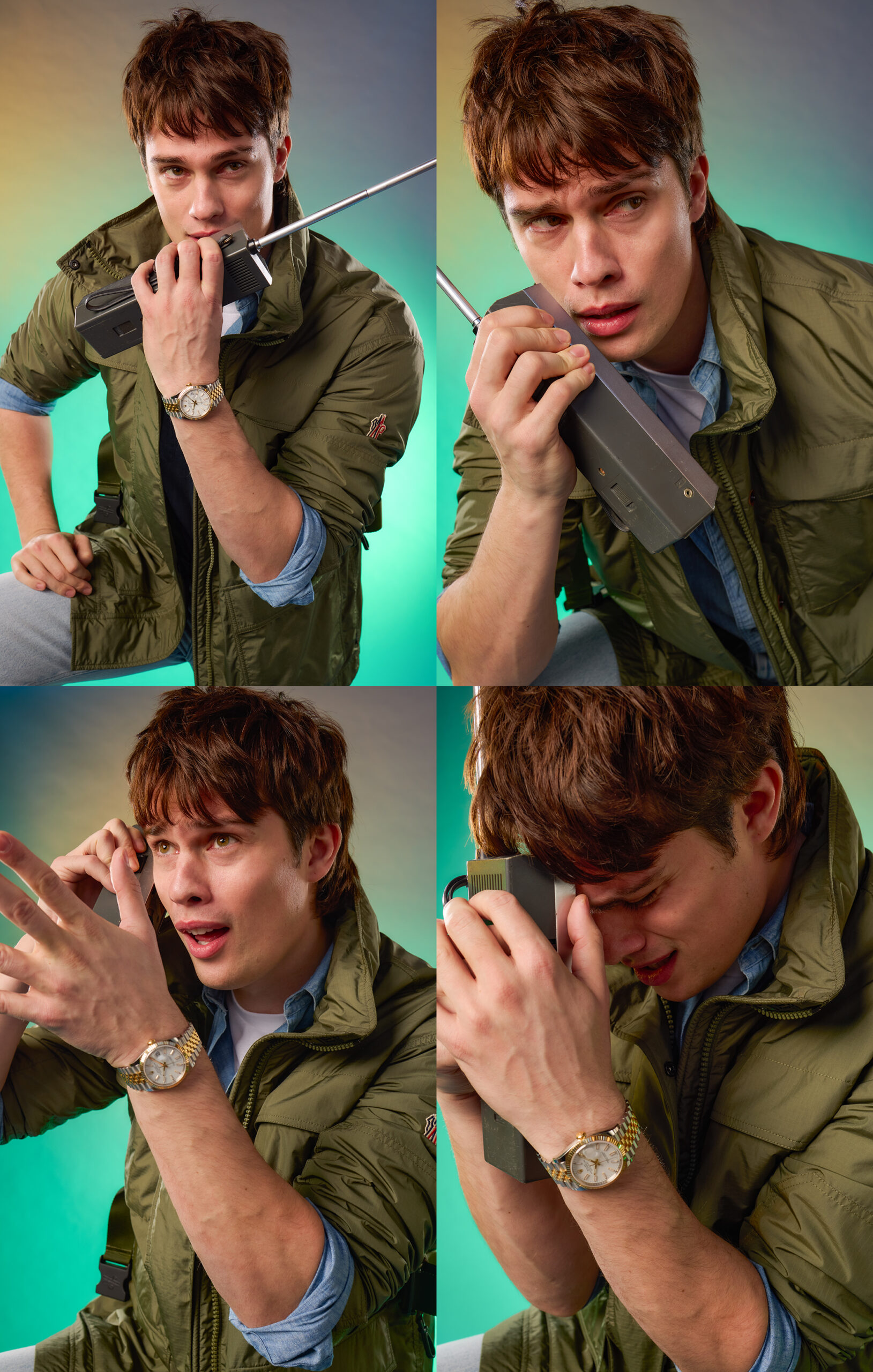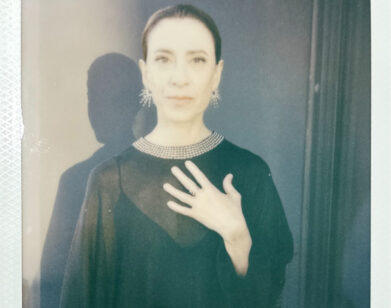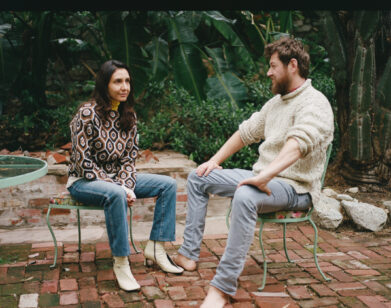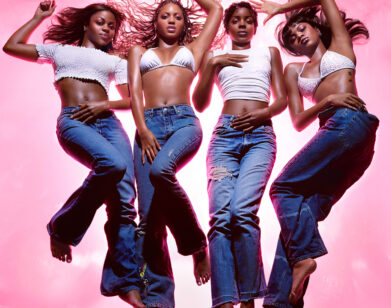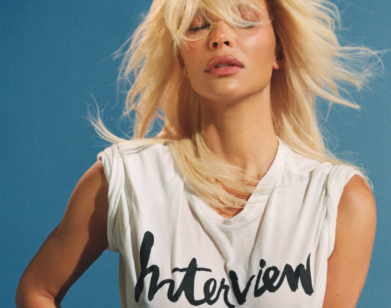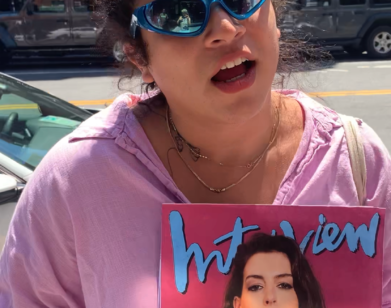HEARTTHROB
Nicholas Galitzine and Anne Hathaway Give Us a Lesson in Chemistry
Not many actors can convincingly front a fictional boy band, but Nicholas Galitzine is one of them. In The Idea of You, sparks fly and hearts break as the 29-year-old British actor plays Hayes Campbell, a Harry Styles–esque superstar who effortlessly woos Solène, a single mother played by Anne Hathaway. The two of them had such insane chemistry that Galitzine, who can also be seen this month opposite Julianne Moore in the period series Mary & George, was basically cast as soon as he walked into the room. But don’t take our word for it.
———
TUESDAY 2 PM FEB. 6, 2024 NYC
ANNE HATHAWAY: First of all, hello.
NICHOLAS GALITZINE: Hello.
HATHAWAY: Would you like to tell everybody where we are?
GALITZINE: In New York City in a tiny, claustrophobic room. It’s like an insane asylum.
HATHAWAY: [Laughs] Okay, do you want to dive in?
GALITZINE: Let’s.
HATHAWAY: What did you have for breakfast?
GALITZINE: An almond croissant and a very strong cappuccino.
HATHAWAY: Are you staying in a hotel?
GALITZINE: Yes, I am.
HATHAWAY: Was the almond croissant from the hotel?
GALITZINE: I don’t know the origins of the almond croissant.
HATHAWAY: Was it room service? Did you go to a cafe?
GALITZINE: Oh, it was room service.
HATHAWAY: Good croissant?
GALITZINE: A fine croissant.
HATHAWAY: Okay, so in this film, you play Hayes Campbell, one of the biggest pop stars in the world. What did you discover about pop stars while preparing for this role?
GALITZINE: I’ve met a couple of them over the years, and I’ve become close friends with some, and the thing that always struck me was their humanity and how textured they are as people. That was naive of me, because as actors who are in the spotlight, people make a lot of assumptions about us, so that was something that really dawned on me.
HATHAWAY: Exactly how deep down the boy band rabbit hole did you go?
GALITZINE: Watching boy band content only gets you that surface-level stuff. It was useful when we were shooting the Coachella stuff—how they hold themselves and everything—but I was less interested in who Hayes was onstage and more interested in who he was with Solène. It’s much less about learning the boy band archetype and more-so who they are as people behind the scenes. I did enough research for the presentational side, but then I focused much more on the script.
HATHAWAY: Last boy band question: What do people misunderstand about boy bands?
GALITZINE: The disconnect between the perfection that they seem to embody and how manufactured a lot of that is.
HATHAWAY: The archetype thing is really interesting. How the band is meant to include an archetype that the maximum number of people can relate to. I wonder how much people feel trapped by having an identity that’s constructed to fit a mold rather than to fit you.
GALITZINE: Yeah, I can imagine a lot of these people feel incredibly stunted.
HATHAWAY: And they’re so young.
GALITZINE: A close friend of mine is Camila Cabello, and she went through the whole X Factor process when she was 15, and it’s really cool to see from an outside perspective how she’s growing into a full-fledged adult not being in that pressure cooker of a band anymore.
HATHAWAY: When I was researching the actors who were auditioning for this, I read about you, and the word that follows you around is chemistry. Is your chemistry conscious or do you just find bonding with people to be fairly easy?
GALITZINE: It’s not conscious, because that would imply some level of inauthenticity, and authenticity is one of my cornerstones. One thing that I do like about myself is I try to show signs of vulnerability, because I’m a very sensitive and anxious person in some ways, and so it’s never felt forced.
HATHAWAY: It never seemed forced.
GALITZINE: Have you ever been in a situation with a costar where you’ve had to manufacture chemistry?
HATHAWAY: Not if it’s in the writing. If it’s not, even if you have chemistry with someone in real life, it’ll be very difficult to conjure it.
GALITZINE: That chemistry test was so integral in creating a real sense of excitement about the whole process. Obviously, I didn’t immediately know I was going to get cast.
HATHAWAY: But you kind of did. [Laughs]
GALITZINE: I’ve never felt that good about an audition, and being able to connect with an actor so quickly, I was like, “If I’m cast, then I feel really good about what we can do.”
HATHAWAY: And then you had to do all of this performing on top of it. Which leads me to my next question: What’s easier to learn, dancing or throwing a javelin?
GALITZINE: Oh god, she’s so good at research.
HATHAWAY: Research?!
GALITZINE: Did I tell you this?
HATHAWAY: Yes!
GALITZINE: [Laughs] Well, for a period, I must’ve been about 15 years old, I was second best for my age group in London at javelin.
HATHAWAY: I want to needlepoint that on a pillow. That’s such a wonderful sentence. The second best at javelin in London for my age group.
GALITZINE: Yeah. Not the best, but second best. I will say that number one actually had a decent distance on me. But what’s harder? Dancing is harder because it’s hard to create that innate feeling of confidence when you’re doing something that you haven’t trained for.
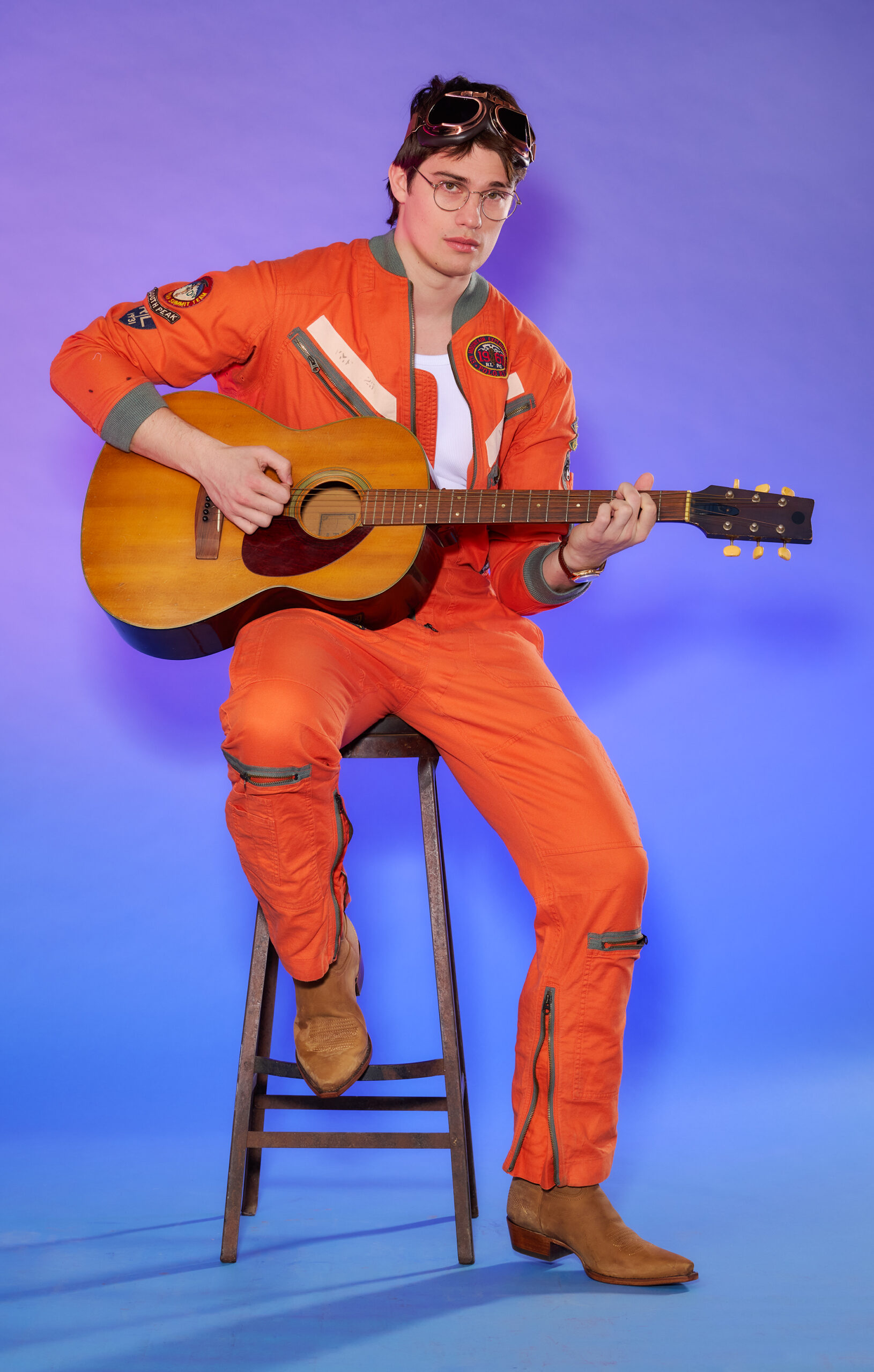
Jumpsuit Polo Ralph Lauren. Tank Top and Goggles Stylistʼs Own. Glasses Moscot. Watch Omega. Shoes Planet Cowboy.
HATHAWAY: This question might be a little weird, so don’t answer it if it’s too basic. I never use words like basic, but I just did. When we were getting to know each other, you told me an anecdote about your sister, and I recalled it and you were really happy that I remembered a detail within the anecdote. You said it showed I was listening. Why is listening so resonant for you?
GALITZINE: It’s a great question. As an anxious, insecure young man, I felt very misunderstood. There was a conflict within me from my teenage years that I really worked through, and I think that being listened to is being seen in a really deep way. I distinctly remember Solène’s speech about her marriage and its unraveling, and I had to do a lot of active listening. When someone can be entirely present and listen, that’s a true sign of connection. I felt very connected to you at that moment.
HATHAWAY: The first director I ever worked with, a wonderful man by the name of Garry Marshall, gave me one of the best compliments when he said, “When I looked at you, I knew there was somebody home behind your eyes.” That’s the way it feels being with you, and acting with you. Like there’s somebody home.
GALITZINE: Wow.
HATHAWAY: You mentioned that you were an anxious, insecure young man. What do you want to say to that version of you? What would’ve soothed him?
GALITZINE: It’s a mantra that I say a lot: Your vulnerability is your superpower. I didn’t realize that would be so rewarding and useful for me as an adult. And I think that as men, it is difficult. The school I went to was very male-dominated, but I grew up around a lot of amazing women who tried to cultivate that, so I was at odds with myself for a really long time. And the anxiety, I think, came from feeling that the vulnerability was a deep weakness and there was something very wrong with me. And I hope that through the last few years, we’ve tried to wear our vulnerabilities on our sleeves, because it’s the thing that binds us.
HATHAWAY: What is the food that makes your soul happy?
GALITZINE: Greek souvlaki in a taverna on the beach with lemon and oregano potatoes.
HATHAWAY: Oh, the potatoes.
GALITZINE: Yeah, and some roast octopus. I’m such a cliché and I know people take the piss because I literally don’t shut up about being Greek.
HATHAWAY: It’s the first time you mentioned it today, so you were restraining yourself. [Laughs] If you could change one thing about being a young actor in 2024, what would it be?
GALITZINE: It’s quite obvious, but the need to constantly be in the zeitgeist can be a bit much. You need to know when to take a step back and texture yourself. There’s this notion that you have to constantly be on the precipice of greatness and curate this career that means doing multiple movies every year. My favorite artists are able to do something fantastic and then take a second and revitalize. And that’s why with social media, I’ve landed in a place where I don’t love being on it so much because I don’t like to seem constantly available.
HATHAWAY: What does texture mean for you?
GALITZINE: Everything. It’s the folds and creases in someone’s face that shows they’ve lived a long and a good life. That’s the one thing that I’m really looking forward to as an actor, is growing older and my body changing, my face changing, and being able to take all that life and that texture and use it.
HATHAWAY: I was thinking about that earlier, actually. There are a couple films that I was in when I was in my twenties, and my reaction shot bums me out because I remember thinking something, and my face looks so blank. I find my ability to express has just become clearer as time has gone on.
GALITZINE: It’s so integral for what we do.
HATHAWAY: I just admitted I was thinking about my face earlier.
GALITZINE: [Laughs] But that’s also the actor’s curse.
HATHAWAY: I was washing my face at the time.
GALITZINE: I still think about so many scenes that I wish I could travel back in time and reshape.
HATHAWAY: Okay, would you rather wear something comfortable or sick as fuck?
GALITZINE: Am I going to get a pint of milk or am I going out?
HATHAWAY: Going out.
GALITZINE: Oh, sick as fuck. Come on. We’re actors. We need some semblance of spotlight in some capacity.
HATHAWAY: Okay, pint of milk? You’re going to say sick as fuck.
GALITZINE: Sick as fuck!
HATHAWAY: [Laughs] But cozy.
GALITZINE: If you can achieve that, then you’re living life.
HATHAWAY: Okay, next question. What formation should Arsenal be playing in?
GALITZINE: Oh, thank you, Anne Hathaway! The people at Interview don’t know that we’re both diehard Arsenal fans. I really believe we’re in a great place right now. Is this a genuine question? Because I will tell you.
HATHAWAY: Mel, you can use as much or as little of this as the readers of Interview want to hear. I just thought this is a good chance to get [Arsenal manager] Mikel Arteta’s attention.
GALITZINE: Listen, Mikel, if you’re looking for an assistant, it is a 4-3-3. It is a 3-5-2 in attack, really. But we need a center forward who’s able to play in those spaces that Martin Ødegaard does, but is a focal point in attack. I don’t think we have that just yet. So we need to dip into the market in the summer because the January transfer window is not a great time to buy. We don’t want to spend money for the sake of it, but I think we’re in a good place.
HATHAWAY: I hope that answer is in the interview. Okay, you have an unexpected day off, where do you hope you are, and what do you do with it?
GALITZINE: Montana, and I’d love to take a horse out and gallop through some fields.
HATHAWAY: Is the horse Quentin?
GALITZINE: [Laughs] The horse is not Quentin.
HATHAWAY: So the readers understand, Nick is in a project called Mary & George alongside Julianne Moore, and in it, his horse was called Quentin, and while he was on set, he sent me lots of pictures of Quentin.
GALITZINE: A fun fact about Quentin is, I thought I was riding Quentin for the entirety of the show, but it actually turns out I was riding three different horses who look very similar. As an equestrian, I thought I knew, but clearly I’m not as good as I thought.
HATHAWAY: [Laughs] You went right into that one off of our film. How was that, in terms of finding George and letting go of Hayes, your character in our film?
GALITZINE: The prep period for Mary & George was very short and involved a lot of costume fittings and research into the history of who this guy was. I would say there’s a level of charisma that both George and Hayes have that I felt like I understood.
HATHAWAY: You are constantly charismatic consistently. [Laughs] You just need to play someone vile.
GALITZINE: But this is the great thing about George. Where we meet him and where we leave him, he’s two different people entirely.
HATHAWAY: Do you think George was born manipulative or it was something he learned?
GALITZINE: Something he learned. In our show, Mary carries much more responsibility for how he ends up. We don’t know how integral she was to that in real life. He was someone who received all of this toxic validation because he was and looked a certain way, and he was rewarded with money and power and status. There are parallels when you think of certain actors in our industry being validated for the wrong reasons. It’s very easy for some people’s egos to fall completely out of check and that’s what happened to George, in a very dramatic way.
HATHAWAY: Does George prefer to wear things that are comfortable or sick as fuck?
GALITZINE: Sick as fuck. Have you seen any of the costumes from that era?
HATHAWAY: Yes, that’s what I’m trying to get you to talk about, the costumes.
GALITZINE: They are not comfortable.
HATHAWAY: You were in a movie that really hit this summer.
GALITZINE: Yeah.
HATHAWAY: I’m talking about Bottoms, by the way. How did that feel? The reason I ask is because it’s really exciting when a small movie breaks through and becomes so in the zeitgeist.
GALITZINE: I have so much joy thinking about that process because I was so afraid of making that movie.
HATHAWAY: Oh, really?
GALITZINE: Yeah. It was just the first out-and-out comedy that I’d done. I was working alongside comedic geniuses like Rachel Sennott and Ayo Edebiri.
HATHAWAY: I would agree with that assessment.
GALITZINE: We’re going to see them as icons going forward. And as someone who had a process by which I usually accessed movies that were more dramatic, you go into a comedy and that process doesn’t apply anymore. It’s very much about being present, not forcing it. It was so collaborative, and I’m just a tiny part of that movie.
HATHAWAY: Okay. I have a couple more. What is the one thing you do for yourself at least once a week that brings you joy?
GALITZINE: A new thing is spoon carving.
HATHAWAY: Oh, your spoon carving! Have you made lots of them?
GALITZINE: I have so many spoons. I’m giving spoons to people at this point. I started making chess pieces, which is the next thing.
HATHAWAY: Oh, wow. What is a surprisingly complicated chess piece to make?
GALITZINE: I haven’t gotten to a rook, because you’re creating a lot of straight edges, which is difficult. I did make a bishop that I was very proud of.
HATHAWAY: Wow!
GALITZINE: Which I will send you a picture of.
HATHAWAY: That’s really cool!
GALITZINE: I don’t care if you don’t want it. I’m sending it.
HATHAWAY: I am very excited to see a bishop picture. What is the one thing you cannot travel without?
GALITZINE: Claritin. My allergies have been playing up. I’m like a Victorian child with pneumonia at the moment. What about you?
HATHAWAY: Face sheets. What is the last great book you read?
GALITZINE: It’s got to be A Little Life.
HATHAWAY: Oh my god. I read that on vacation.
GALITZINE: Not a good vacation book.
HATHAWAY: Not a beach read.
GALITZINE: I’m trying to manifest that into a movie or a limited series. It’s been really hard because it’s an epic.
HATHAWAY: Okay, this is one of the first questions you asked me. What would your last meal be?
GALITZINE: This is a really important question, and I know it top to bottom. For a starter, I’m going grilled octopus. Then roast lamb and roast potatoes, the way my mom makes it. And then some tiramisu and a nice whiskey on the rocks.
HATHAWAY: Oh, you would?
GALITZINE: Yeah, I don’t drink, currently. I haven’t for a few years, but this is my last meal and I’m thinking, fuck it.
HATHAWAY: Mine would be chocolate croissant with an almond latte, and then just pomodoro e basilico.
GALITZINE: So simple.
HATHAWAY: Okay, we’re almost done. Do you believe in regret?
GALITZINE: Yes. I think having regrets is really useful. You need to let them go one day, but they’re very learning feelings. As actors, they’re really useful when we think about our past work and wishing we had done things differently. They can be very galvanizing.
HATHAWAY: Oh, yeah. I always find it really hard because as soon as I finish the movie, I know how to make the movie, and you just want to go back to the beginning and speed through it again.
GALITZINE: That would be a brilliant experiment, to make the same movie twice.
HATHAWAY: Okay, last question. What is one thing that is challenging that you wish came easier? You give the impression of somebody that picks things up easily.
GALITZINE: I’m in a constant battle to be present. I have to drag myself to that point sometimes. I find it easier when I’m on a film set and I’m in a scene to do that.
HATHAWAY: Anything you want people to know that I didn’t hit?
GALITZINE: I really want to keep talking about Arsenal’s formation, to be honest.
HATHAWAY: [Laughs] Was that okay?
GALITZINE: That was wonderful.
HATHAWAY: Really?
GALITZINE: That was more than I ever hoped it could ever be.
HATHAWAY: Oh my god.
GALITZINE: But I knew this was just going to be so easy with you.
———
Grooming: Melissa Dezarate using La Mer at A-Frame Agency.
Set Design: Jerry Schwartz at Art Department.
Lighting Technician: Eduardo Silva.
Photography Assistant: Nathaniel Jerome.
Fashion Assistant: Chloe Shaar.
Fashion Intern: Octavio Iglesias.

